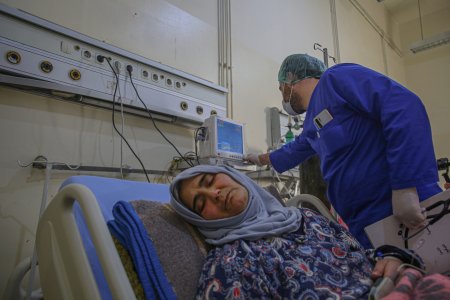
The number of COVID-19 deaths has increased by 50 times since the Beirut port explosion—compared to the total number of deaths recorded in the first six months of the pandemic. These numbers should be a wake-up call for the country’s leaders to invest in public health if they want to avert future health crises, says Project HOPE.
“The COVID-19 pandemic has revealed major deficiencies within the health care sector in Lebanon,” says Rabih Torbay, CEO and President of Project HOPE. “By not investing in its public health system, Lebanon is struggling to meet the demands and needs of the population during a pandemic, and as a result, lives are lost every day.”
Lebanon’s health system is predominantly private, with more than 80% of the country’s health budget directed toward private institutions. Some of these private hospitals have yet to receive COVID-19 patients, according to local reports.
As of February 1, 2021, Lebanon’s COVID-19 death toll exceeded 3,100—with a 7-day average of 110 deaths. Since the Beirut port explosion on August 4, 2020, the numbers of cases and deaths have increased alarmingly, causing significant strain on hospitals and frontline health care workers. In January 2021 alone, Lebanon recorded 1,627 deaths related to COVID-19. This is more than the total number of deaths—1,455—recorded in 2020, according to Lebanon’s Ministry of Health.
For several weeks, hospitals in Lebanon have been operating beyond capacity and in some cases, treating patients in parking lots. Shortages of oxygen and ventilators have been widely reported. Doctors and nurses have been working around the clock, often without adequate and sufficient equipment.
“The COVID-19 pandemic and the port explosion have taken a severe toll on frontline health care workers. Not only are they dealing with the pain of a traumatic event, but they are also left to make life and death decisions they should not have to make,” says Torbay.
“We were unprepared, uninformed, confused and trying to learn from other countries in how to deal with the COVID-19 situation, and then the blast happened,” a doctor from Karantina Hospital in Beirut told Project HOPE. “It was the worst moment of my life, even though I grew up in Lebanon during the civil war. This situation was something completely different. It was like the apocalypse.”
Project HOPE calls on Lebanese authorities, international donors, and aid organizations to prioritize investments into the public health sector to strengthen its capacity in order to resist future shocks, and to significantly invest in the protection of health care workers. “Health care workers are the backbone of Lebanon. They must be offered better protections. This includes better working conditions, as well as being paid fairly and on time for the work they are doing,” says Torbay.
Source: Hope







